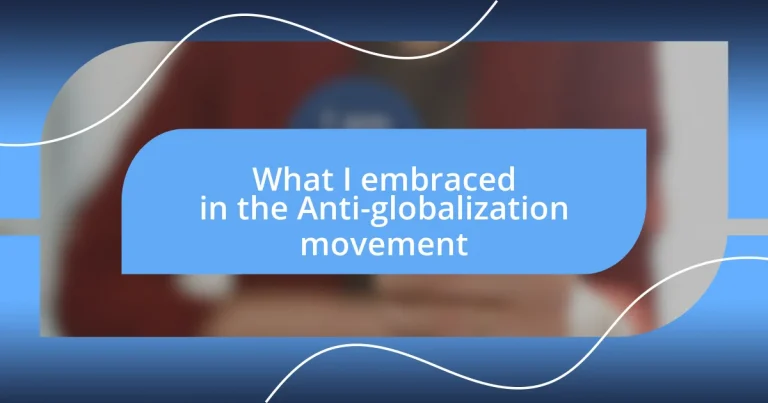Key takeaways:
- The anti-globalization movement emerged in response to the negative impacts of globalization, prioritizing local empowerment and cultural diversity over multinational corporate interests.
- Key principles include supporting local economies, preserving cultural identities, and advocating for environmental responsibility, emphasizing the interconnectedness of local choices and global consequences.
- Future efforts are expected to evolve through grassroots movements, digital activism, and collaborative initiatives that promote sustainability and economic justice across diverse communities.
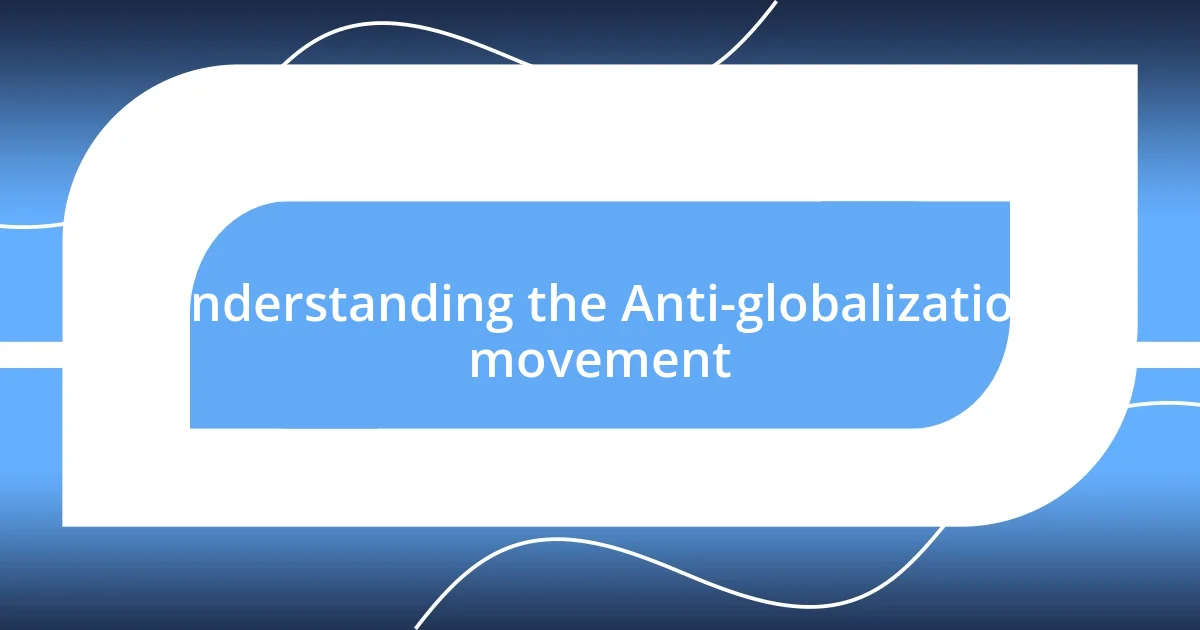
Understanding the Anti-globalization movement
The anti-globalization movement emerged as a response to the rapid spread of global markets that often overlooked local communities and cultures. I still vividly remember attending a local rally where passionate speakers reminded us that globalization isn’t just an economic term; it’s felt in our daily lives. Has there ever been a moment when you felt overwhelmed by a foreign corporate presence in your own neighborhood?
At its core, this movement challenges the idea that a globalized economy is inherently good for everyone. When I learned about the negative impacts of sweatshops and the exploitation of workers, it stirred a sense of outrage within me. It’s hard not to feel a personal connection when you realize that people across the globe are suffering for the sake of lower prices in our stores.
People often think of the anti-globalization movement as simply opposing big business, but it’s more nuanced than that. It signifies a yearning for local empowerment and sustainability. I have seen communities transforming their local economies in innovative ways, showcasing that we can support our neighbors while honoring diverse cultural identities. Isn’t it inspiring to realize that change starts at the grassroots level?
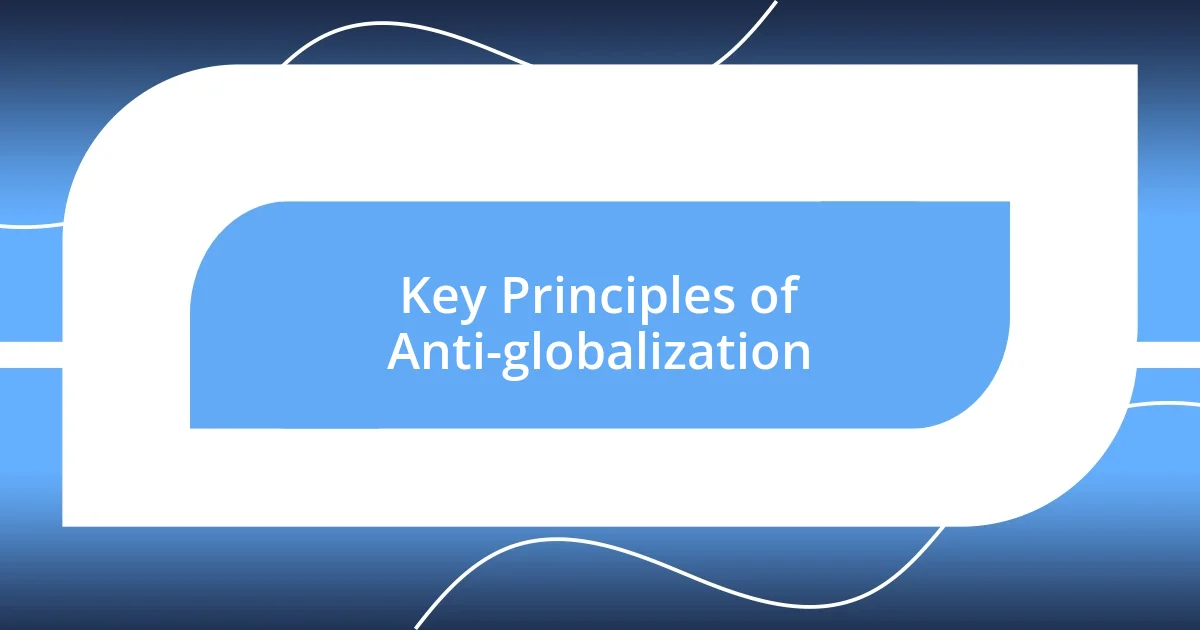
Key Principles of Anti-globalization
The principles of anti-globalization are deeply rooted in a quest for social and environmental justice. One key principle I discovered is the importance of local economies, which emphasizes supporting small businesses over multinational corporations. I recall walking through a nearby farmer’s market, surrounded by vibrant stalls filled with local produce and handmade crafts. It felt empowering to buy directly from the people who pour their hearts into their work, knowing my choices help build a more sustainable community.
Another essential aspect is the commitment to preserving cultural diversity. The movement advocates for unique local identities to thrive rather than being homogenized under a global culture. I remember attending cultural festivals showcasing music and art from around the world. Those experiences reminded me how diverse cultures contribute to the richness of our society and how crucial it is to resist the one-size-fits-all approach of corporate globalization.
Finally, anti-globalization emphasizes responsible environmental practices. Many participants, like myself, understand that the planet’s health is interconnected with our economic choices. When I read about companies polluting local waterways for profit, it stirred a protective instinct within me. This principle drives home the idea that caring for our environment is not just a trend; it’s a necessity for the future of generations to come.
| Key Principles | Description |
|---|---|
| Local Economies | Support for small businesses and local producers over large multinationals. |
| Cultural Diversity | Preservation of unique local identities against the homogenization of global culture. |
| Environmental Responsibility | A commitment to sustainable practices that protect our planet’s health. |

Reasons for Embracing the Movement
When I started delving into the anti-globalization movement, it became clear that the motivations were deeply personal for many, including myself. I realized how much I cherish my community’s unique flavors, sounds, and traditions, which often seem overshadowed by the relentless drive for global uniformity. It’s a heartbreaking thought to imagine a world where local artisans and farmers struggle to survive against the powerful tide of global corporations.
Here are some key reasons that resonated with me and many others who share this journey:
- Connection to Local Identity: I feel a profound sense of belonging when I attend local events celebrating our heritage, reinforcing the importance of preserving our identities.
- Empowerment Through Choice: Choosing to buy from local markets feels like an act of rebellion against corporate control—the thrill of supporting my neighbors is invigorating.
- Understanding Global Interconnectedness: Through my research, I discovered how the struggles faced by workers abroad are tied to my own consumption habits, making me reconsider my impact.
Each of these aspects has fueled my commitment to embracing the movement, each anecdote and insight adding layers to my understanding. I can’t help but feel that our choices collectively shape the world around us.
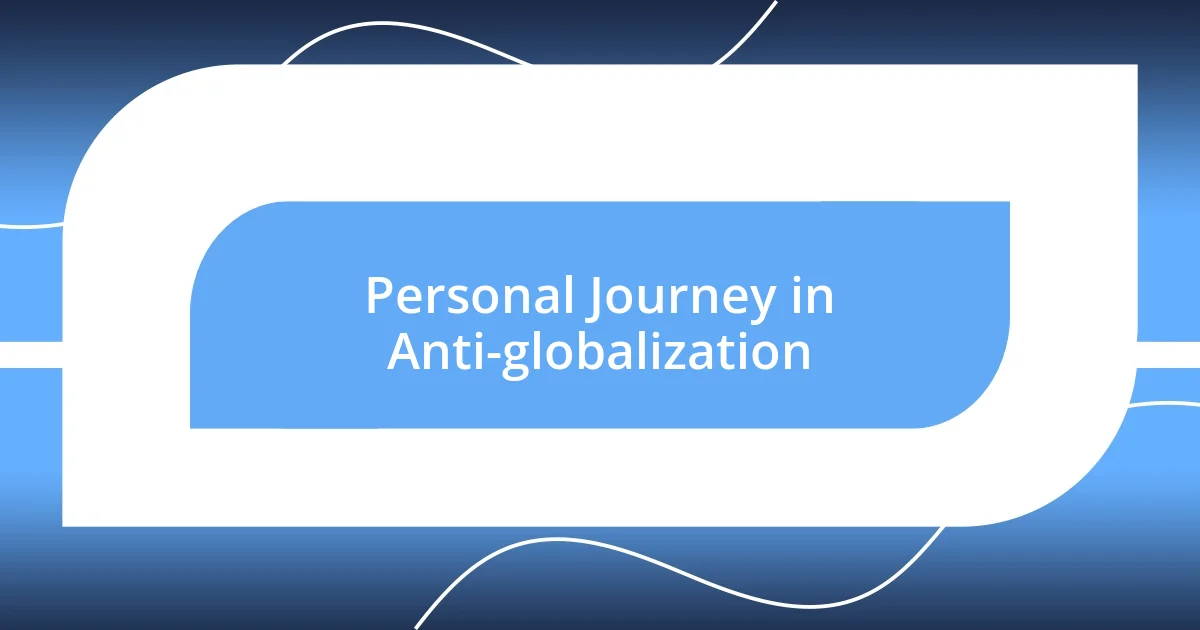
Personal Journey in Anti-globalization
Reflecting on my journey in the anti-globalization movement, I remember the first time I attended a community forum discussing the impacts of multinational corporations on our local farmers. I sat in a crowded room, pulsating with energy and passion, as individuals shared their stories and experiences. Their heartfelt testimonials struck me deeply; how could I ignore the voices of those who work tirelessly to feed us, only to be overshadowed by faceless corporations?
As I began to engage more with local initiatives, I attended a workshop on sustainable practices. It was here that I felt the difference between passive support and active involvement. Watching a small local business owner demonstrate eco-friendly packaging made me realize how my choices could directly influence others’ livelihoods. What if every purchase I made reflected my values? From that moment, I made a conscious effort not just to buy local but also to spread the word about sustainable living within my circle.
The more I learned, the more I felt an emotional connection to these principles. I vividly recall a moment at a protest rally where we chanted for fair wages for workers everywhere. It struck me that globalization has a human cost, often ignored in debates. I left the event with a renewed determination to voice my concerns and challenge the status quo. Why should economic success only benefit a select few? Embracing the anti-globalization movement became not just a political stance for me but a personal mission intertwined with my own values and beliefs.

Actions Taken Within the Movement
In the anti-globalization movement, direct actions taken by individuals and groups have often been powerful and impactful. One memorable action I took was participating in a local “buy local” campaign, where we encouraged our community to support nearby businesses instead of opting for large chain stores. I remember the energy in the room as we crafted slogans and made plans. It felt invigorating to witness firsthand how a collective voice can spark change.
Additionally, organizing awareness events was another crucial part of the movement. One of my most vivid experiences was a public art installation that showcased the stark contrasts between local artisans and global mass production. As people walked through, they shared their thoughts and questioned their own consumer habits. I couldn’t help but feel a sense of unity and purpose as we engaged in discussions about real, tangible alternatives to globalization. It was during moments like these that I realized how interconnected we truly are.
There’s also the aspect of grassroots activism, where many of us rallied together to challenge corporations directly. I recall joining a peaceful protest outside a major retailer, holding signs demanding fair labor practices. The rush of solidarity I felt with my fellow protesters was electrifying, a genuine expression of our shared frustrations and hopes. It made me ponder: When we unite for a common cause, how can we not envision a world shaped by our values instead of profit alone?
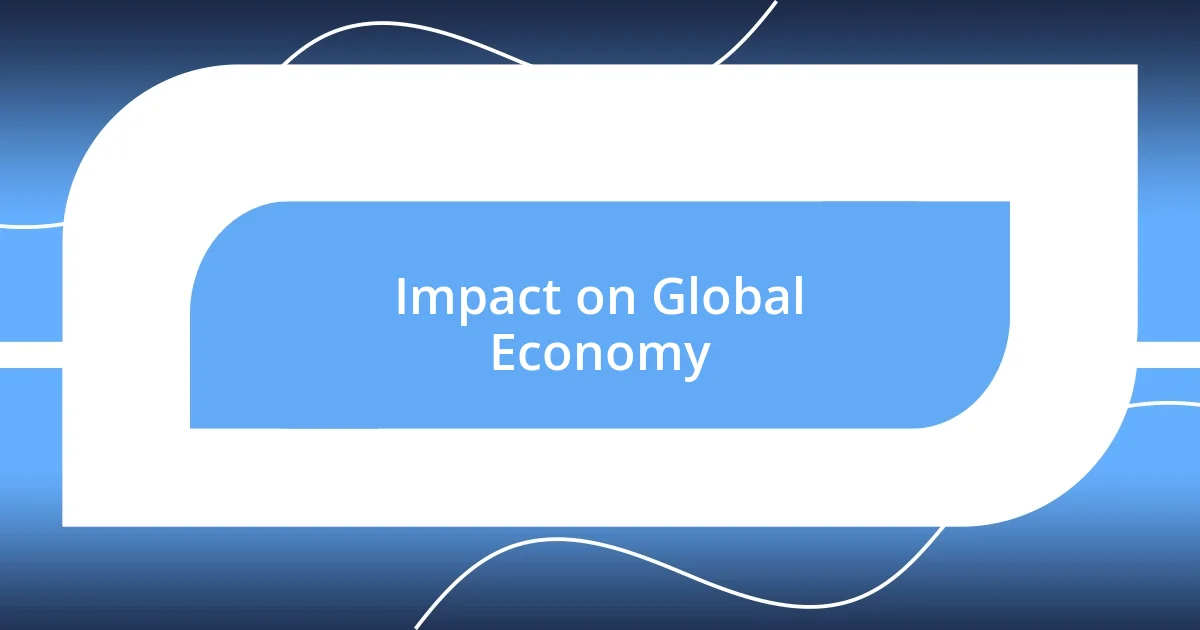
Impact on Global Economy
The impact of the anti-globalization movement on the global economy reveals some surprising shifts in perspective. I remember listening to a passionate speaker at a conference who asserted that globalization often prioritizes profit over people, leading to exploitation rather than collaboration. This notion resonated with me—how could we advocate for economic systems that uplift communities instead of depleting them?
As I delved deeper, I observed how local economies began to flourish when communities took a stand against multinational corporations. For instance, after a series of local buy-local campaigns, I visited a farmers’ market that had doubled its vendors in just a few months. This growth was not merely quantitative; the qualitative shift was evident too. I could see the pride in the faces of those selling their goods, knowing they were contributing directly to their neighbors’ well-being. Doesn’t it make you wonder what economic resilience looks like when we prioritize shared values over sheer volume?
The pushback against the global economic model has also sparked discussions about fair trade practices. While attending a community meeting, I heard firsthand accounts from farmers who benefited from fair trade certifications, allowing them not only to earn a living wage but also to invest in their families and communities. This made me realize that a fairer economy is possible when consumers make conscious choices. Could it be that each purchase we make becomes a vote for the kind of world we want? As I reflect on these experiences, the idea of a more equitable global economy feels more within reach than ever.
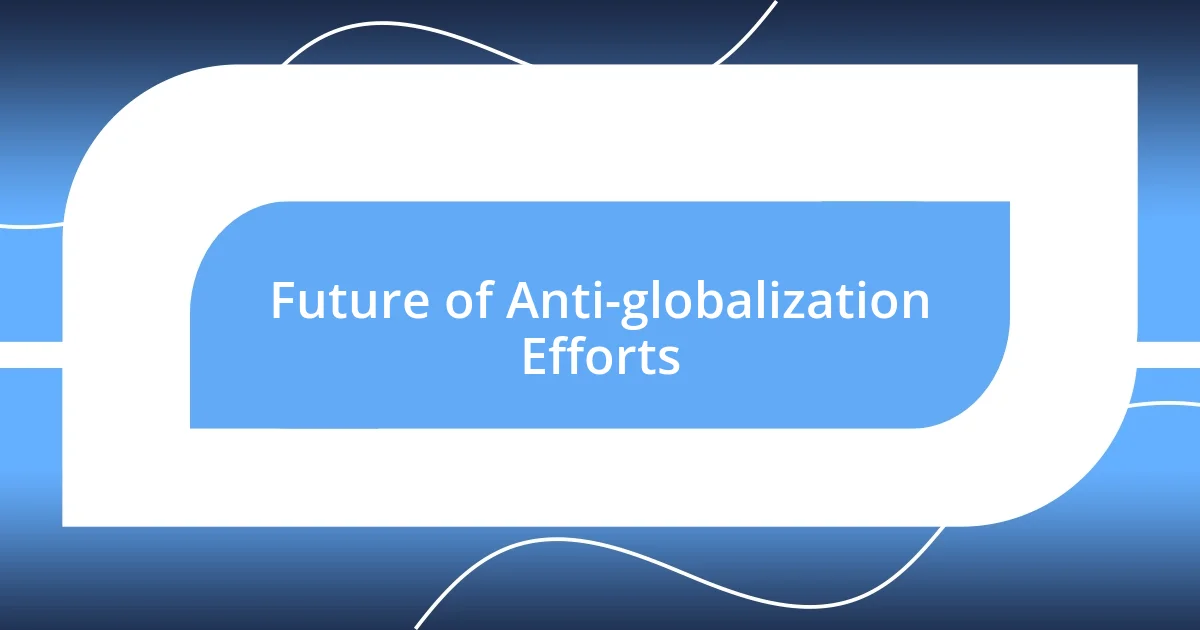
Future of Anti-globalization Efforts
The future of anti-globalization efforts is poised for significant evolution, driven by grassroots movements and local initiatives. I recall a discussion with a friend who had just returned from a summit focused on sustainable living. She was bursting with ideas about creating localized networks that promote community resilience. Isn’t it fascinating how a few passionate voices can inspire a broader shift toward self-sufficiency and sustainability?
As technology continues to bridge distances, I envision a new wave of digital activism emerging. A memorable moment for me was attending an online webinar where activists from across the globe shared strategies on how to resist corporate monopolies. The enthusiasm in that virtual space was palpable, as we exchanged ideas on harnessing social media to elevate local stories and challenges. Can you imagine the power of united voices, amplified through technology, advocating for change in unison?
Looking ahead, I believe collaboration among diverse movements will shape the anti-globalization landscape. A local festival I attended last year illustrated this beautifully, merging environmental and social justice initiatives. The energy was infectious as different groups showcased their missions, reminding me that our battles against global inequality are interconnected. The question lingers: how might this multidimensional approach redefine the future of economic justice?












